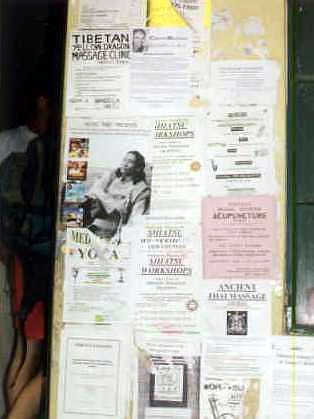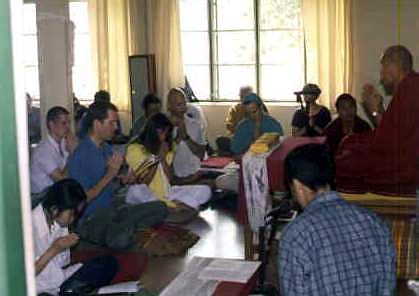- Manpreet Singh in India
- mpreet@hotmail.com
The place is a spirituality-sellers’ paradise. Tibetan Buddhism is the new
fad--`like blue jeans’—amongst the world’s spirituality shoppers who flock
to Dharamsala, known as the "Little Lhasa in India". Home to near 15,000 Tibetan
refugees in India it became a hot destination with foreign spiritual pilgrims and tourists
after Tibetans' spiritual and political leader His Holiness Dalai Lama got Nobel Prize for
peace in 1989.
With Tibetan image becoming popular world over anything with Tibetan
and Buddhist tag is a big business here. Ready-made variety of spiritual experiences is
the packaged deal. The walls of McLeod Ganj are cluttered with posters of Buddhist
spirituality, meditation, philosophy, rainbow reading, moon power, Zen; besides Tibetan
cooking medicine and yoga which overshadow a few signs exhorting the boycott of
Chinese-made goods and seeking Tibet’s freedom. Teaching Buddhism is a lucrative
business proposition. 
A large number of young and old foreigners with freshly tonsured heads
(some in newly acquired maroon Buddhist robes) make a beeline to attend philosophy and
meditation classes. Squatting in the dimly-lit incense-smoked rooms, and struggling to
chant in Tibetan language some `mantras' after the Lama's voice-- is the scene they love
to be in.
Thubten Samphel, Information Secretary with the Tibetan
Government-in-Exile sees the commercialisation of Buddhist spirituality in a larger
context, "Any philosophy from the east has become industry. The materialistic western
world finds itself in a spiritual vacuum and looks towards the east and it becomes a
demand-and-supply kind of thing. It’s sad, but you can’t prevent people from
desiring to make more money."
Thubten even justifies foreigners’ `flirtation with Tibetan
Buddhism' as it leads to desired political objectives: "It all may seem commercial
but it is an opportunity for us to make the world aware of what’s happening in Tibet.
There are some foreigners who have taken serious interest and supported our cause of
Tibet’s liberation from China, only after taking interest in Tibetan Buddhism, wisdom
and culture."
But many Tibetans find this idealised and romanticised view of Tibetan
culture and Buddhism as `crazy’. A sort of experiment and fashion with foreigners.
"Buddhism is quite a fashion here," says Tenzin Kunga, a young monk at Tse Chok
Ling Monastery. "It’s even ridiculous. After attending a 3-4 day course, they
think themselves to be masters of religion. Some even start teaching Buddhism to make
money. Most foreigners are simply crazy, a few serious and some really clever."
 Buddhism is a very intensive and
deep religion. There also are serious students of Tibetan culture and religion, though a
few. Says Tyler Dewar, 24, a Canadian studying Buddhism for the last two-and-half years;
and is in McLeod Ganj for the second time, "I find the handful of people in Canada
who take interest in religion have more solid grounding in Buddhism than the overflowing
streams of foreigners taking classes here. I think most foreigners are testing waters or
may be looking for some entertainment through spiritual experimentation. Moreover, they
also need to fill time in a remote country." Tyler's ambition is to land in a job as
a translator of Tibetan language.
Buddhism is a very intensive and
deep religion. There also are serious students of Tibetan culture and religion, though a
few. Says Tyler Dewar, 24, a Canadian studying Buddhism for the last two-and-half years;
and is in McLeod Ganj for the second time, "I find the handful of people in Canada
who take interest in religion have more solid grounding in Buddhism than the overflowing
streams of foreigners taking classes here. I think most foreigners are testing waters or
may be looking for some entertainment through spiritual experimentation. Moreover, they
also need to fill time in a remote country." Tyler's ambition is to land in a job as
a translator of Tibetan language.
Admitting spiritual starvation of the west Tyler explains: "The
young people in the west find Buddhism and other eastern religions attractive as they are
not authoritative like Christianity. Although I was born to a Christian family but in my
heart I never felt I was a Christian."
"Religion of convenience" is how Ella Benami, an Israeli
woman finds Buddhism. Ella studied Buddhism in Nepal for two months but finds practicing
religion quite easy here: "Buddhism in Nepal was more ritualistic, while here
it’s more comfortable and convenient."
Most of the westerners spiritual-shopping in the world land in McLeod
Ganj due to the presence of His Holiness Dalai Lama which lends an aura of spiritual
ambience to the place. Tibetan Government in Exile holds classes in Buddhist philosophy at
Tibetan Library and Archives at nominal prices. Only these classes have some amount of
seriousness and are quite favourite with the foreigners. Other spirituality-shops that
have mushroomed all over the town seek to rake moolah, religiously. Spiritual healers,
Yoga and Reiki masters have also joined the bandwagon, lured by lucre. Such
commercialisation certainly undermines religious sanctity.
As an old Buddhist monk R. Tsering puts it: "Most foreigners
don’t find anything sacred about religion. It's a new experiment like a new dish. For
them it’s a plaything, a time-pass in a foreign land. And they have dollars at which
the growing number of spirituality-sellers aim at. As religion becomes secondary in the
race for money, reverence is lost." Sanctity in any business is in terms of profit
making. Targeted by spirituality-sellers the foreign tourists are promised `complete
awakening', `spiritual clarity' or `multi-dimensional vision' in this `unusual spiritual
pilgrim's destination in the world'. The only enlightenment they may get, if they are
seeking any, from the roadside spiritual gurus is in the lighter weight of their wallets.
Spiritually, they may return as dry as they had come, some even disillusioned.